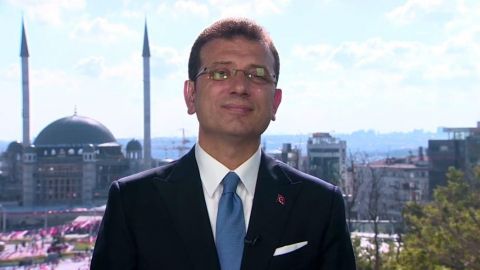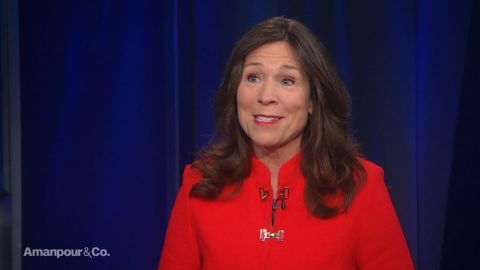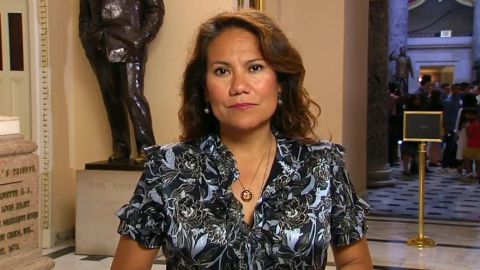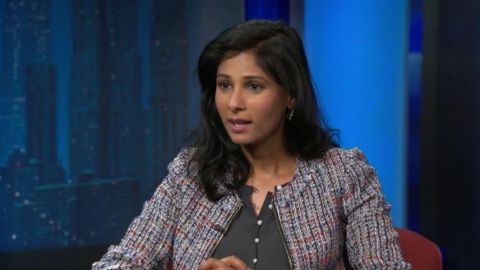Read Transcript EXPAND
WALTER ISAACSON: Welcome to the show. We’re honored to have you.
GITA GOPINATH, CHIEF ECONOMIST, INTERNATIONAL MONETARY FUND: Thank you for having me on the show. It’s a pleasure.
ISAACSON: The IMF in its latest quarterly report that you do, lowered the expected growth rate for the global economy from about 3.5 percent to 3.3 percent. What is it that lowered it? What are you worried about?
GOPINATH: Global growth in the second half of 2018 weakened across the globe. And that weakness was a combination of factors. It’s had to do with the trade tensions. But it also had something to do with the normalization of interest rates in the U.S. with the Fed raising interest rates. And then there were one-off issues in certain countries. And all of that weakened growth and that kind of spilled over into 2019. So that’s what lead us to downgrade the forecast for 2019 to 3.3 percent.
ISAACSON: How bad is the problem of trade?
GOPINATH: It is one of our biggest risks to the global outlook. And we are very concerned about it. This has implications not just for U.S. and China but globally for the world economy because it affects business sentiment. And we’ve seen investment slowing and we, in fact, our projections for trade right now look quite weak.
ISAACSON: And is that because of — partly because of the Trump tariffs on China?
GOPINATH: The tensions are an issue. Absolutely. The tariffs that were imposed in 2018, the escalation that we’ve seen right now, the uncertainty of what is going to happen around the G20 meetings at the end of the month. All of that is weighing on the outlook. When President Trump imposes tariffs, he said China would be paying for it. You studied it now and seen what’s happened. Who ended up paying those tariffs?
GOPINATH: So if you look at the prices of those goods on which tariffs were imposed coming in from China, the prices excluding tariffs coming from China hadn’t changed much. What that tells you is that almost all the tariff revenue that has been collected is being born by the U.S. importers.
ISAACSON: In other words, U.S. companies are paying the price for those tariffs?
GOPINATH: The U.S. companies that continue to buy from China are paying the price of those tariffs.
ISAACSON: We talk about the problems of trade and how lowering trade will be bad for the global economy. But those of us, I’ll put myself in the category and I guess you in the category who have been long-time believers in free trade, part of the Davos Aspen Consensus. Were we a little bit wrong about the effects of trade? And did it hurt some people more than others?
GOPINATH: The expectation was that trade like you just said would be good for the global economy. We were always aware that there would be distribution consequences, that there will be some who will be left behind who would not gain from trade. The assumption was that domestic policies would be used to mitigate the concerns associated with that. And I think where we were wrong was in our expectations of how well that would work. And the bottom line is that it didn’t work very well. And so that’s what we’re living through right now.
ISAACSON: And by that, you mean that it led to an increase in wealth inequality?
GOPINATH: It’s — I mean wealth inequality has come around for many reasons. But you’re certainly seeing certain communities in certain parts of the world where people have lost their jobs, their livelihoods. The expectation was always that these people would move, that they would move to where the jobs exist. And I think what has surprised many is that that hasn’t happened. You don’t see much mobility. And so there’s now the view that while maybe policies have to be about improving the communities itself where these people live.
ISAACSON: Let me go personal for a moment. You grew up in India, in a very distinguished family, right, and very well educated. What did you learn from your mother and father that you’re applying to your work today?
GOPINATH: That’s a great question. For my father, it was all about hard work. I think those are the two words I heard from him all my life, that hard work. And not in the sense of it being painful hard work but joyous hard work is very important. From my mother, it was humility and realizing that there are some things you can do and some things you can’t do. So I think those were the two aspects of my growing up that I remember.
ISAACSON: Tell me your path from growing up in India to becoming a distinguished professor in the economics department at Harvard and now to the IMF. How did that path work?
GOPINATH: Oh, it happened with a lot of hiccups, with absolutely no clear sense of where I was going. So I cannot claim to say that I wanted to be an economist. When you grow up in India, you know, the assumption is that you will become a doctor or an engineer, not an economist. So it’s a bit — it was all kinds of stumbling and then I finally got here. But I did enjoy most of the time what I did. And it was with a lot of support from my family, from my wonderful husband, and my son. And so, yes, I think it was a mix of things that got me to where I am.
ISAACSON: And tell me what your academic specialties were that got you to become a professor at Harvard.
GOPINATH: I specialized in international finance and international trade. So those were the two big areas. And within those, I worked a lot on currencies. For instance, most recently, I did work on the international role of the dollar and how it dominates the trade and the financial system. I do work on capital flows, on sovereign debt, many of these issues.
ISAACSON: As an expert on debt, do you worry about the American debt, the U.S. deficit and how it might grow and how that can affect the world economy?
GOPINATH: In our assessments, the U.S. debt is on an unsustainable path to an important degree because there are all these liabilities related to pensions and health care that are coming out in the future. And that’s going to add to the deficit in the future and that’s going to add to the debt in the future. So that is from a more medium to long-term perspective, that is certainly an issue. And we recently put out our surveillance note on the U.S. where we mentioned that, we flagged that.
ISAACSON: And what does that mean when you say you put out a surveillance note and exactly what did you say?
GOPINATH: One of the three things that the fund does is to monitor countries. It’s part of the mandate just to figure out to come out with a report on how countries are doing, the health of their economies, the appropriateness of their policies. And so we had one come out for the U.S. recently where we did say, the U.S. economy was quite strong, growing at around 2.6 percent. Obviously, plenty of jobs being created. But at the same time, it certainly is the case that there are all these payments and liabilities are coming with the future and the fiscal situation, we need to pay attention to that too.
ISAACSON: Do you think that the accumulating debt in the United States could lead to a setback soon?
GOPINATH: Soon, I don’t see that. In the near term, there is a very large global appetite for what we call safe assets and U.S. Treasuries are one of the safest in the world, which is why that the U.S. capital can borrow at incredibly low rates. So in the near term, no. But this is more of a medium to a long-term concern.
ISAACSON: So this period of global growth of the economies that we’ve been in for more than a decade, it seems, how vulnerable is it? I mean could something happen that could really cause the next recession globally?
GOPINATH: We described the situation right now as being what we call a delicate moment. And while we project that there will be a recovery towards the end of this year into 2020, we describe that as precarious. And I believe that is still very true. One of the big factors is trade. So a lot is going to depend upon what happens on the trade front with trade tensions, what happens at the end of this month, around the G20 between the U.S. and China. That is going to be, in my opinion, one critical factor for the global economy.
ISAACSON: So you say it’s precarious. What could happen? I mean could there be a real global slowdown in the next two or three years?
GOPINATH: Absolutely. Yes, in the next two or three years of horizon, if these — if the trade tensions don’t deescalate, if Brexit ends up with being no deal, all of which can change financial market sentiments dramatically. And we’re living in a world with very high levels of debt. Both in the private sector and the public sector. So there’s a sudden escalation in costs. That can then trigger a financial tightening of the world economy, which will be costly for the world economy. So many of these features, you know, can create — can have a dampening effect on growth in the future.
ISAACSON: Has there been a significant increase in wealth inequality over the past 20 or 30 years? And if so, how dangerous is that to free market and capitalist economies?
GOPINATH: There has been an increase in wealth inequality. And clearly, we need to respond to that particular — to that fact. The question is why has that happened? It varies across countries. Explanation varies across countries. For instance, if you look at in the U.S., in the matter especially of income inequality, waging inequality, it makes a huge difference which firm you work for. So if you do the exact same job for a top one percent firm, you get paid a whole lot more than elsewhere. So that’s one factor. So the question is why is that the case? Why a convergence across firms? Then there is the issue of corporate market power that is a reason that one needs to look into about has there been too much concentration in certain firms that’s exercising market power? That’s another issue. There is some evidence that there has been an increase in market power. So certainly, we need to be more vigilant about competition policy. We need to be more vigilant about free entry into industries. All of those factors have to — are important to maintain the market system that exists right now.
ISAACSON: Am I hearing you say that perhaps Facebook, Amazon, Google, and a lot of big tech companies have gotten so big that they have concentrated market power and that globally we need to find ways to increase competition?
GOPINATH: We certainly need to find ways to increase competition. We put out a report in April that said that there was a significant increase in market power. Now, some of that is basically the return that you earn because you put in a lot of investment upfront. But there is also part of it that feels like more of an excess return which seems like less of a competition. And so while at this point, it is still quantitatively not such a big issue. We expect that it could be going forward. So it is important for us to be very vigilant on this front.
ISAACSON: What policies to address wealth inequality and income inequality should and could countries implement that would be useful as opposed to unintended consequences?
GOPINATH: There are a combination of things and there’s no one prescription fits all. But for some countries, it could be a more distributive taxes. For certain others, it has to be better skilling programs. You need more ways of encouraging mobility to jobs in regions where — places where jobs exist. So there are multiple factors that have to be done. It has to be making sure that the sufficient competition and not build up of high market power. There needs to make — we need to make sure that everybody pays their fair share of taxes. So all of these factors will matter.
ISAACSON: Do you think that automation and more broadly artificial intelligence and machine learning will end up decreasing the number of jobs in the future?
GOPINATH: We’ve had technological improvements over the decades. And every time there’s been a big new technology, people have been concerned about whether there would be enough jobs. And what we’ve always seen is that the world economy has grown. There’s been more jobs. And right now, we’re living where many parts of the world are closer for employment — I mean unemployment rate in the U.S. is one of the lowest it’s been in a long time. So that’s not necessary. That’s not where the world has to end up. But at the same time, what that requires also is preparing to make sure that people are ready for that world when there’s much more automation.
ISAACSON: Your colleague at Harvard, Larry Summers, when confronted with that notion that every time we’ve had a technological advance, we end up with more jobs and not fewer. He Says he’s now in the camp of this time, it’s different. Do you feel that this time it may be different? The threat of artificial intelligence and automation on the overall number of jobs?
GOPINATH: I think it’s impossible to say at this point. I think what we can say right now is that there is nothing in the data that we see that suggests a big shift is significant enough to say, well, this is now a huge problem. I mean there are suggestions of it that with all the technological improvements that are happening already showing up in jobs, that’s not the case. Now, going forward, whether it might happen, it’s possible. But I’m not — I don’t necessarily feel sure that this time is that different.
ISAACSON: What keeps you up at night?
GOPINATH: Following what is happening in the world from a minute-to-minute basis and all of these fronts that I just mentioned, figuring out what is happening with policy. I think policy uncertainty is probably the number one factor that’s weighing on growth in the world economy.
ISAACSON: And by policy uncertainty, do you mean things like erratic trade and tariff announcements coming out of the White House?
GOPINATH: Nope. Business, jobs, investment, all of that relies on functioning in a certain predictable environment. Usually when it’s rules-based. And the uncertainty that we’ve seen recently with the unpredictability about what is going to happen with trade, with the unpredictability on Brexit, I mean these are factors that will keep pretty much everybody up awake at night.
ISAACSON: And do you think it’s the role of the IMF to focus on things like financial inclusion and inequality? Or is it mainly to focus on growth and economic stability?
GOPINATH: We’ve come to realize that the two are very closely related. So issues of inequality are macro-critical. They have an implication for growth today. The issues of the climate that were previously thought of as being way out there and now something within the horizon of the fund is clearly not the case anymore. We’re seeing far more natural disasters. We have financial institutions that could be very susceptible to these kinds of risks. So we think of those things being closely related.
ISAACSON: Thank you so much for being with us.
GOPINATH: Thank you.
ISAACSON: It’s fascinating. Thank you.
GOPINATH: Thank you so much.
About This Episode EXPAND
Christiane Amanpour speaks with U.S. House Democrat Veronica Escobar about the situation at the Souther border. Ekrem İmamoğlu and Kori Schake join the program to discuss Turkey’s current political situation. Gita Gopinath joins Walter Isaacson to discuss the state of the global economy and her own personal journey growing up in India.
LEARN MORE



